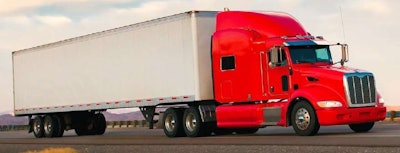 Company drivers looking to make the switch to truck ownership, take heed: Because you’re used to focusing on driving, it’s easy as a new owner-operator to throw paperwork in a drawer and plan on getting to it later. But not keeping up with business details can cost you thousands.
Company drivers looking to make the switch to truck ownership, take heed: Because you’re used to focusing on driving, it’s easy as a new owner-operator to throw paperwork in a drawer and plan on getting to it later. But not keeping up with business details can cost you thousands.The industry has made it way too easy to move from being an employee driver to owning a truck. Far too many drivers give no real thought as to what it means.
List the top three reasons you want to be an owner-operator. No. 1 usually is to make more money. Then it’s more freedom, less hassle, fewer rules, etc. If your answers sound like these, think again before you proceed.
The top reasons for getting into business should be the challenge of accomplishing the work, starting a new venture that will give you the opportunity to make more money and create a better life for your family, and the opportunity to build a business model that allows you to make more of the choices that affect your life.
If one of your top reasons was that you are confident you can own and operate the truck better than anyone else and create a value proposition for your customers through hard work and smart choices, then you are on the right path.
Answer these questions before you take the leap.
Does owning your own truck really mean more money?
It might, but it’s no guarantee. You actually could lose a lot of money.
Will you have more freedom?
You might find that you have a lot less freedom. If a company driver’s truck breaks down, the carrier figures out how to get it fixed. When you own the truck, that’s your problem.

You already know that when the truck is down, you’re not getting paid. But when you own the truck, it’s worse because you also have fixed expenses to cover.
When you are a company driver, you have the freedom to live your own life once the key is out of the ignition. When you own the business, the paperwork and other responsibilities never go away.
As a company driver paid by the mile, you don’t care about the freight rate in any given area or lane, but when you own the truck, you do.
Are you willing to live on less money?
It’s likely you’ll have to cut spending in order to support the business. Prepare yourself and your family for how it will feel to make those sacrifices.
Are you willing to work more hours?
In the beginning, you will need to drive 70 hours a week and spend extra hours behind the scenes to keep the business running. You’ll also need to continue your professional training in order to grow the business. But with proper planning, much of the additional work can be accomplished while you’re on the road without taking hours away from your home time.
How does your spouse feel about this venture?
There are going to be tough times and hard decisions to make, and nothing will sabotage this venture faster than fighting about it with your spouse. Such disagreement can make every day miserable, but teamwork can make it a wonderful adventure that strengthens your relationship.
 Overdrive’s Partners in Business seminars, conducted twice yearly at the Great West and Great American trucking shows in partnership with ATBS, offer strategies toward building owner-operator business acumen.
Overdrive’s Partners in Business seminars, conducted twice yearly at the Great West and Great American trucking shows in partnership with ATBS, offer strategies toward building owner-operator business acumen.If you’re new to the owner-operator game and need further resources for exploration of the business model, find further in the nation’s leading owner-operator business resource, the Overdrive/ATBS collaborative Partners in Business manual and seminar series. More details, including sample PIB manual chapters and videos with Kevin Rutherford at PIB seminars on various topics, visit this page.









